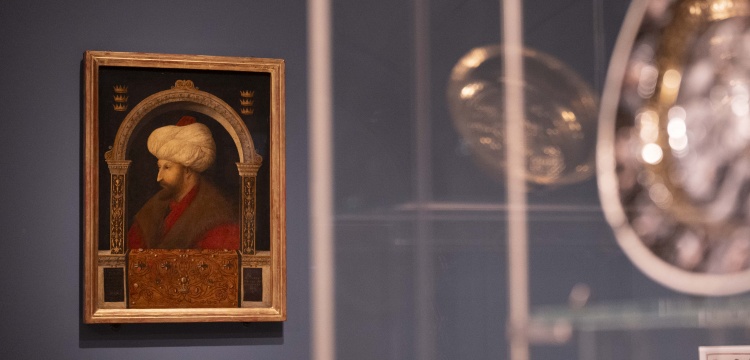Famous portraits of Sultan Mehmet are exhibited in t the Victoria and Albert Museum

In the portrait painted by the Italian painter Gentile Bellini, "Conqueror of the World" is written, while the three great victories of the Conqueror are symbolized with three crowns in both the medallion and the portrait... Also the medallions made by two Italian artists have the portrait of Fatih on one side and figures on horses on the other side.
London's famous museum displays Ottoman sultan's portraitMehmed the Conqueror's famous portrait displayed in London
The famous portrait of Ottoman Sultan Mehmet the Conqueror by Italian artist Gentile Bellini is on display at the Victoria and Albert Museum in London.
Also on display are bronze medallions with portraits of the sultan by Bellini and two other artists.
An Anadolu reporter compiled details about Bellini's work named Portrait of Mehmet II and the three bronze medallions with reliefs of the sultan.
Portrait reads 'Conqueror of the World'
The works of art were conceived when Mehmet the Conqueror invited Bellini to Istanbul in 1479. Bellini stayed in Istanbul until 1481, during which he painted the renowned portrait of Sultan Mehmet and crafted bronze medallions depicting him and other Ottoman figures.
Although the inscriptions on the painting, which were thought to be created in 1480, are partially damaged, one indicates Mehmet's title as the "Victor Orbis" or conqueror of the world.
Symbolism is prevalent in the portrait, with three crowns representing Mehmet's significant victories: the conquest of Istanbul, Konya, and the Greek Empire in Trabzon.
The door in which Mehmet is depicted symbolizes the state and the place where justice is established in Ottoman art.
Giovanni's medallion represents Mehmet's victories
The exhibit also includes three medallions featuring Mehmet the Conqueror.
Bellini's medallion, crafted during his visit to Istanbul, is the only known piece made by the artist.
Another medallion, owned by Constanza de Ferrera, shows Mehmet on horseback, while Bertoldo di Giovanni's medallion symbolizes the Sultan's military victories.
While the provenance of these artworks is not fully documented, they have entered the museum inventories as legacies from various collectors.
The exhibition sheds light on Mehmet the Conqueror's significance in European art during the period, showcasing his enduring legacy beyond the borders of the Ottoman Empire.
AA
